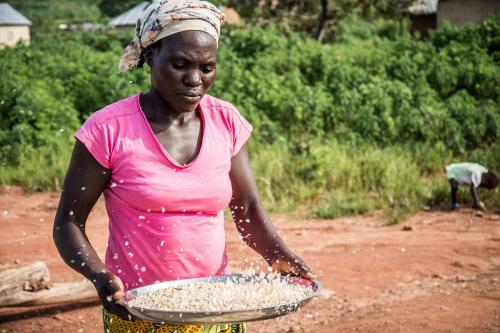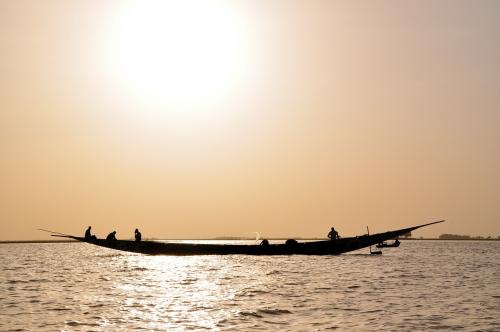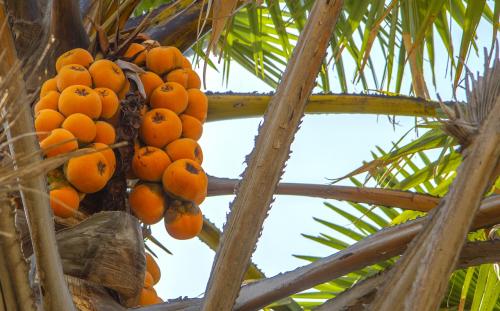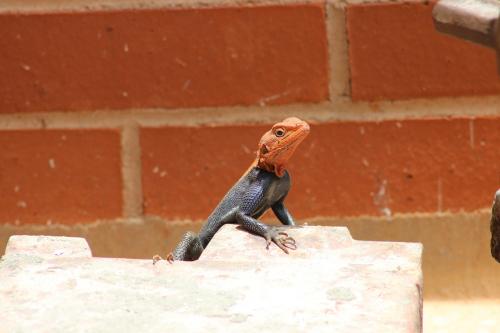Seasons in Nigeria
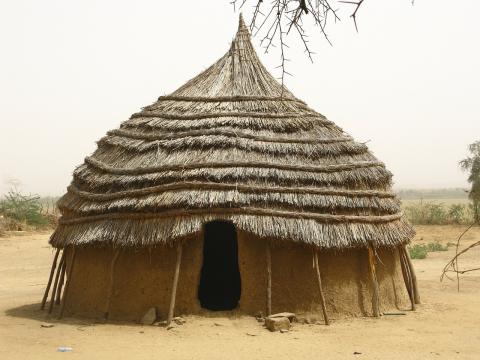
The Republic of Nigeria is located on a plateau, having a height of 600 meters above sea level. A narrow strip of swampy terrain extends along the Gulf of Guinea, and the country is divided into large climatic regions separated by river valleys.
The equatorial-monsoon climate prevails in Nigeria. The most humid regions are the delta of the Niger and the south-east of the country, there is more than 4000 mm of precipitation in a year. Areas are occupied by forests and receive a little less moisture - depending on the year, its number varies from 1600 to 3000 mm. In savannah, the intensity of rain decreases as it moves from south to north. In the central regions of the country it’s even drier - the annual amount of precipitation doesn’t exceed 1400 mm, the Joe Plateau is an exception, on which the humidity is somewhat higher. The most arid is the north-east of the country (not more than 500 mm per year).
The climate of Nigeria has two distinct seasons, which form the main types of air masses. One of them is the sea equatorial air, which in the summer brings wet winds from the coast, and then a low pressure zone appears over the desert, and the other is a continental tropical one, and it is transported from the Sahara by a dusty dry wind of the Harman.
The rainy season in the country lasts from March to September, and only in the south it is briefly interrupted in August, and the dry season falls on the remaining months of the year (in the north it lasts longer than in other regions). Before the beginning and end of the wet season, it is exhausting hot weather usually, which is accompanied by short-term thunderstorms, but from May to August they give a way to prolonged rains.
The average annual temperature in the country is above +25 °С (77 °F). It’s very hot in the north from March to June, and in the south - from February to April, as at this time the air heats above +25 °С (86 °F), during the rainy season the temperature drops somewhat. Average daily temperature fluctuations in Nigeria are felt much more than a month or a year. They are especially strong in the north of the republic during the period when the Harmatan is blowing, then it is very hot in the daytime - above +40 °С (104 °F), and at night the thermometer's column drops below +10 °С (50 °F).
Even the habitual population is quite difficult to tolerate the dry season. From the hot wind, the throat and mucous membrane of the nose dry up, lips crack, and dust gets into the mouth and eyes.
Seasons
Contents:
March-May in Nigeria
In March, the water in the Gulf of Guinea is heated to +28 °C (82 °F) ... +29 °C (84 °F). The air temperature in the daytime fluctuates between +34 °С (93 °F) ... +35 °С (95 °F). At night, the thermometer is held at +23 °C (73 °F). In March, one rainy day appears. Humidity rises to 38%. The speed of movement of air masses doesn’t exceed 2-5 m/s.
In April, the south-western wind blows mainly. On average, the air mass velocity is 3 m/s, but gusts up to 18 m/s occur. Temperature values throughout the day range from +23 °С (73 °F) ... +32 °С (89 °F). In the month, 87 mm of precipitation is recorded, and it rains about 5 days. The number of cloudless days is reduced to 7. The humidity level is set at 58%.
Rainy Season (April to October)
In May, it gets cold to +30 °C (86 °F), and at night the thermometer keeps within +23 °С (73 °F). The level of precipitation rises sharply, now a month falls 162 mm. 9 rainy days are recorded. The air humidity is 69%. The wind speed doesn’t exceed 5 m/s. The water temperature in May is +28 °C (82 °F).
Climate from April to May
| March Max average t°: +35 °C (95 °F) Min average t°: +22 °C (71 °F) Sundial in the day: 10.5 hours Rainy days: 0 days Precipitation: 7 mm (0.3") |
| April Max average t°: +34 °C (94 °F) Min average t°: +23 °C (73 °F) Sundial in the day: 10 hours Rainy days: 3 days Precipitation: 49 mm (1.9") |
| May Max average t°: +32 °C (89 °F) Min average t°: +22 °C (72 °F) Sundial in the day: 9.5 hours Rainy days: 4 days Precipitation: 59 mm (2.3") |
(Abuja)
June-August in Nigeria
In June, 177 mm of precipitation is recorded. It rains for 10 days. The wind speed is 3 m/s. However, sometimes there are hurricanes with gusts up to 45 m/s. The air temperature in the daytime is +29 ° С (84 °F) ... +30 °С (86 °F), and at night the column drops to +22 °С (72 °F).
In July, the temperature indicators throughout the day vary in the range of +22 °С (72°F) ... +26 °С (79 °F). The level of precipitation increases sharply, and now 413 mm falls in 17 rainy days. Humidity rises to 85%. The wind speed is set within the limits of 2-7 m/s. The water in the Gulf of Guinea is cooled to +25 °C (77 °F) ... +26 °C (79 °F).
August in Nigeria is the coldest and rainiest. The daily air temperature ranges from +24 °С (75 °F) ... +25 °С (77 °F), and at night the air is cooled to +21 °С (70 °F). 504 mm of precipitation are recorded, which fall within 18-20 days. The sun emerges from behind the clouds only one day a month. Humidity of air also reaches a maximum, 90%. The water temperature is set at +25 °C (77 °F). The wind speed doesn’t exceed 5 m/s.
Climate from June to August
| June Max average t°: +30 °C (85 °F) Min average t°: +21 °C (69 °F) Sundial in the day: 8 hours Rainy days: 3 days Precipitation: 47 mm (1.85") |
| July Max average t°: +28 °C (83 °F) Min average t°: +20 °C (69 °F) Sundial in the day: 5.5 hours Rainy days: 11 days Precipitation: 148 mm (5.8") |
| August Max average t°: +28 °C (82 °F) Min average t°: +20 °C (68 °F) Sundial in the day: 4.5 hours Rainy days: 15 days Precipitation: 199 mm (7.8") |
(Abuja)
September-November in Nigeria
In September, the air temperature during the daylight hours ranges from +25 °С (77 °F) ... +28 °С (82 °F), and at night the column is kept at +22 °С (72 °F). The level of precipitation gradually decreases, now 326 mm of precipitation falls within 8 days. The air humidity is 87%. Water in the sea in some places warms up to +26 °С (79 °F).
In October, temperatures are set in the daytime in the range of +28 °C (82 °F)... +31 °C (88 °F), and at night they are reduced to +22 °C (72 °F). It rains for 9 days. A month falls 102 mm of precipitation. Humidity is within 78%. The western wind is blowing mainly at a speed of 2-7 m/s. The water temperature in the Gulf of Guinea varies between +26 °C (79 °F) ... +27 °C (81 °F).
Dry Season (November to March)
In November, in Nigeria, the sun is not covered by clouds for 19 days. Rain isn’t recorded. The amount of precipitation falls to 4 mm, and the humidity level is set at 47%. Daytime air temperature averages +31 °C (88 °F), and night +22 °C (72 °F). The water in the bay warms up to +27 °С (81 °F).
Climate from September to November
| September Max average t°: +29 °C (84 °F) Min average t°: +20 °C (68 °F) Sundial in the day: 7.5 hours Rainy days: 12 days Precipitation: 131 mm (5.2") |
| October Max average t°: +31 °C (87 °F) Min average t°: +20 °C (68 °F) Sundial in the day: 9 hours Rainy days: 3 days Precipitation: 36 mm (1.4") |
| November Max average t°: +32.5 °C (91 °F) Min average t°: +19 °C (66 °F) Sundial in the day: 8 hours Rainy days: 0 days Precipitation: 0.5 mm (0.02") |
(Abuja)
December-February in Nigeria
In December, the water temperature in the Gulf of Guinea in some places reaches +28 °C (82 °F). The average daily air temperature varies within +21 °С (70 °F) ... +32 °С (90 °F). The wind speed in this month doesn’t exceed 6 m / s. Precipitation is not recorded, and the number of cloudless days goes to the maximum. 24 days in a month the sky doesn’t drag out clouds.
The air temperature in January in Nigeria during daylight hours varies within +32 °С (90 °F), and at night the thermometer's column drops to +21 °С (70 °F). In a month, 3 mm of precipitation is recorded. There are no rainy days. And the number of cloudless days is kept at a maximum (24 clear days). Humidity is equal to 22%. The wind speed is 2 m/s, but in places the gusts reach 7 m/s. The water temperature in January fluctuates at +27 °С (81 °F) ... +28 °С (82 °F).
In February, daytime air temperature fluctuates in the range of +33 °С (91 °F) ... +34 °С (93 °F). At night, the thermometer is set at +23 °C (73 °F). Precipitation is not recorded in this month. However, air humidity rises to 30%. The wind speed doesn’t change, 2-7 m/s. The water temperature in the Gulf of Guinea is equal to +28 °C (82 °F).
Climate from December to February
| December Max average t°: +33 °C (91 °F) Min average t°: +17 °C (62 °F) Sundial in the day: 11 hours Rainy days: 0 days Precipitation: 0.0 mm (0.0") |
| January Max average t°: +32.5 °C (91 °F) Min average t°: +18 °C (64 °F) Sundial in the day: 11.5 hours Rainy days: 0 days Precipitation: 0.5 mm (0.02") |
| February Max average t°: +34 °C (94 °F) Min average t°: +19.5 °C (67 °F) Sundial in the day: 11 hours Rainy days: 0 days Precipitation: 2.9 mm (0.11") |
(Abuja)
 Seasons of the Year
Seasons of the Year 
